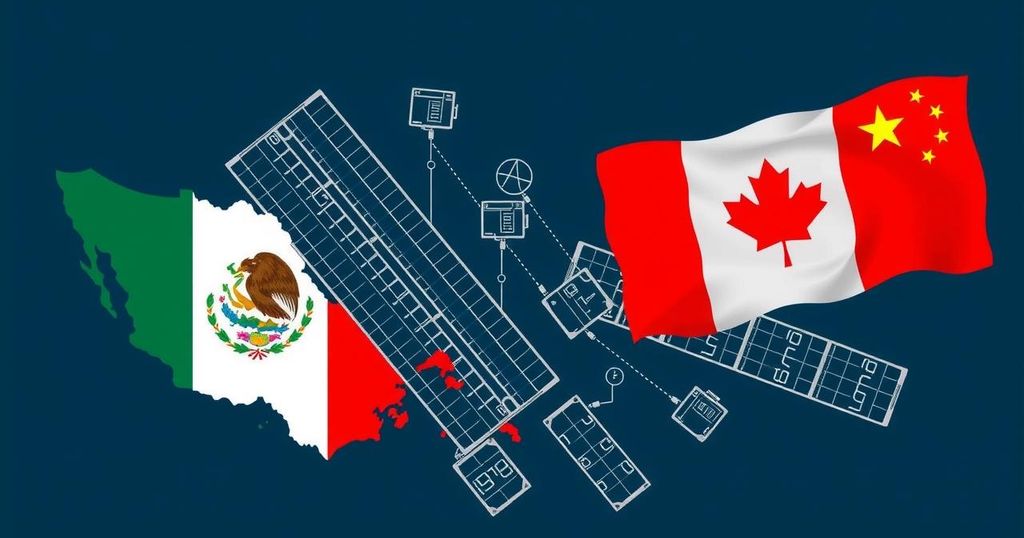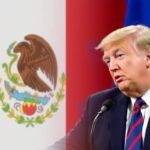Trump’s Plans for Imposing Tariffs on Mexico, Canada, and China on Inauguration Day
President-elect Trump threatens to impose a 25% tariff on products from Mexico and Canada, and an additional 10% tariff on Chinese imports aimed at combating illegal immigration and drug trafficking. This announcement comes amid a backdrop of ongoing concerns over fentanyl smuggling and the economic impact on trade relations, particularly with Canada and Mexico.
President-elect Donald Trump has made alarming statements regarding the potential implementation of substantial tariffs on Mexico, Canada, and China as part of his initial actions after assuming office. On January 20th, he indicated that he would sign executive orders imposing a 25% tariff on all products imported from both Mexico and Canada, a measure aimed at addressing illegal immigration and drug trafficking issues. Trump expressed concerns over an influx of people whom he believes are contributing to crime and drug problems in the United States, despite data showing a decline in violent crime.
Moreover, Trump vowed that these tariffs would persist until issues related to illegal immigration and drug trafficking, particularly fentanyl, are resolved. Should these tariffs be enacted, they could significantly increase consumer prices on a wide array of products, as the United States is the largest global importer, with Mexico, Canada, and China representing its primary suppliers.
In his social media announcements, Trump also directed criticism toward China regarding the substantial quantities of drugs entering the United States, further threatening to impose an additional 10% tariff on Chinese imports as leverage. There remains uncertainty regarding the actual enforcement of these proposed tariffs; they may instead serve as a tactic for negotiations prior to his officially taking office.
As fentanyl trafficking has surged in recent years, with border seizures cataloging a sharp increase, Trump has emphasized his administration’s commitment to halting this crisis. His nominee for treasury secretary, Scott Bessent, has noted that tariffs can serve as effective negotiation tools to achieve broader foreign policy goals.
If implemented, these tariffs would notably challenge both Canadian and Mexican economies and raise questions concerning the integrity of the updated trade agreements established during Trump’s previous administration, particularly as these agreements are due for review in 2026.
The article discusses the implications of President-elect Donald Trump’s announced intentions to impose significant tariffs on imports from Mexico, Canada, and China. This move is part of a broader strategy to tackle issues surrounding illegal immigration and drug trafficking, particularly focusing on the challenges posed by fentanyl smuggling across the U.S. border. Tariffs, as proposed, could dramatically impact consumer prices and the economies of the involved nations. Trump cites the historical context of these issues, linking them to rising concerns about border security and drug-related crime, despite current statistics indicating a decrease in violent crime rates. Additionally, his stance reinforces a previous trend of using tariffs as a negotiating tool in international relations, particularly in response to perceived failures in cooperative efforts to address drug trafficking and border control.
In summary, President-elect Trump’s threats of imposing new tariffs on Mexico, Canada, and China reflect his fervent commitment to addressing illegal immigration and drug trafficking as soon as he takes office. While these tariffs could serve as powerful economic tools, their actual implementation remains uncertain. The proposed measures highlight the interplay between international trade policies and national security concerns concerning drug trafficking, particularly fentanyl. As Trump prepares to take office, the potential economic ramifications of these tariffs raise critical questions about their viability and implications for the future of U.S. trade relationships with its closest allies.
Original Source: www.cbsnews.com








Post Comment